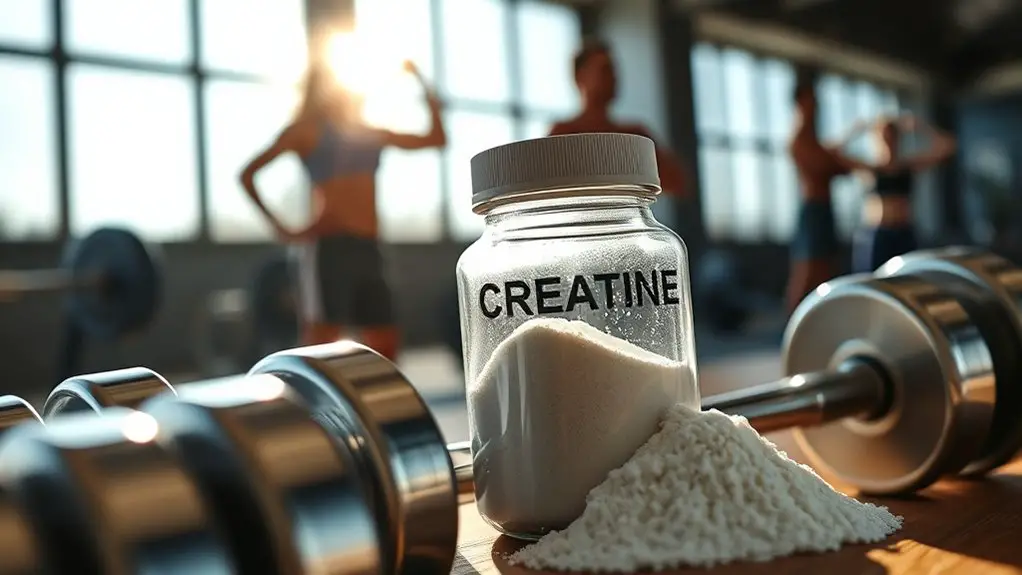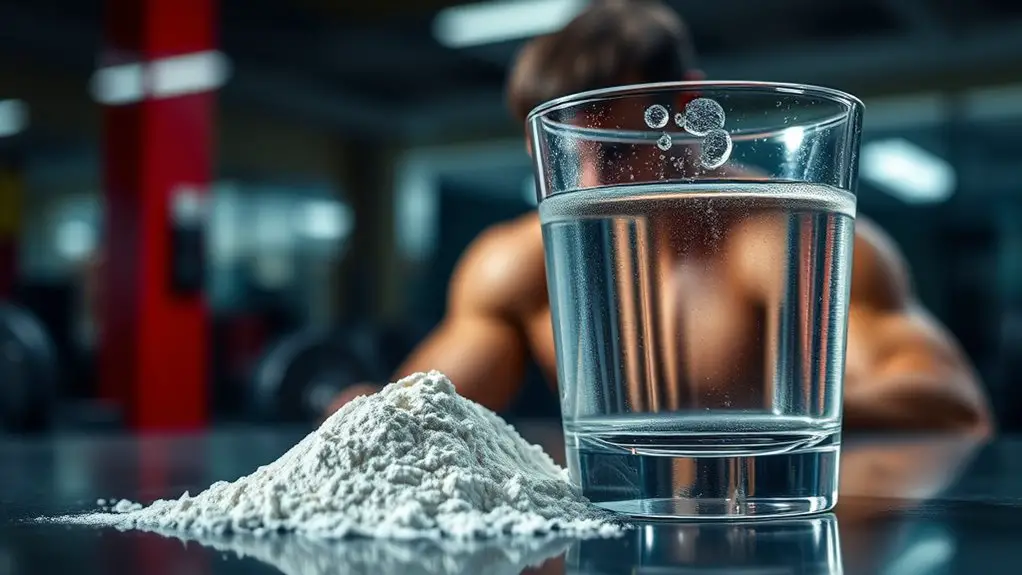The Role of Creatine in Gym Performance

Creatine plays an essential role in gym performance by enhancing strength and endurance. It regenerates ATP, your muscles’ primary energy source, allowing you to lift heavier and push through more reps. You’ll also benefit from faster recovery and reduced soreness between workouts. It’s important to stay hydrated when taking creatine, as it draws water into your muscles. There’s a lot more to discover about how to use creatine effectively for your training goals.
What Is Creatine and How Does It Work?

Creatine, a naturally occurring compound found in muscle cells, plays an essential role in energy production during high-intensity exercise. You might wonder about creatine sources; it’s primarily found in red meat and fish, but many choose supplements for convenience. It’s important to know that, despite some common creatine myths—like it being harmful or causing water retention—most research shows it’s safe for healthy individuals when used correctly.
When you take creatine, it helps replenish ATP, the energy currency your muscles rely on for quick bursts of strength or power. This means you can potentially perform better during intense workouts. If you’re considering adding creatine to your routine, consult a healthcare professional to verify it aligns with your fitness goals and health status. Always prioritize safety and informed choices in your fitness journey.
The Science Behind Creatine Supplementation
When you’re looking to enhance your gym performance, understanding the science behind creatine supplementation can be incredibly beneficial. There are a few key points to reflect on that debunk common creatine myths and highlight safe practices:
- Energy Production: Creatine helps regenerate ATP, your muscles’ primary energy source during high-intensity workouts.
- Loading Phase: Some believe you need a loading phase, but following proper supplementation guidelines, a consistent daily dose may be just as effective.
- Hydration: Creatine can draw water into your muscles, so staying hydrated is essential for safety and performance.
- Long-term Use: Many worry about long-term effects, but research shows creatine is generally safe for most individuals when taken as directed.
Benefits of Creatine for Strength Training

Understanding how creatine works sets the stage for exploring its specific benefits in strength training. Creatine enhances your ability to perform high-intensity exercises, allowing you to lift heavier weights and complete more repetitions. This increase in power output can lead to greater muscle growth over time.
It’s essential to separate fact from fiction when considering creatine supplementation. Many creatine myths suggest it’s unsafe or leads to unwanted weight gain; however, research supports creatine safety when used responsibly. Most people tolerate it well, and it’s been extensively studied for years.
When you incorporate creatine into your routine, you may experience improved recovery times and reduced muscle soreness, helping you get back to the gym sooner. Ultimately, using creatine can be a valuable ally in your strength training journey, provided you stay informed and choose a reputable product. Prioritize your safety, and you’ll reap the benefits effectively.
Enhancing Endurance With Creatine
If you’re looking to improve your endurance, creatine might be a game-changer. It boosts ATP production, giving your muscles the energy they need for longer workouts. Plus, its recovery benefits can help you bounce back faster between sessions.
ATP Production Boost
Creatine plays an essential role in ATP production, which is crucial for enhancing endurance during workouts. When you supplement with creatine, you can experience several key benefits that support ATP synthesis:
- Increased Energy: More ATP means you can power through longer sessions without fatigue.
- Improved Performance: Enhanced ATP availability can lead to better overall workout performance.
- Faster Recovery: While we won’t explore recovery benefits now, it’s worth noting that effective ATP production aids in quicker muscle replenishment.
- Boosted Strength: Increased endurance from ATP supports heavier lifts and more intense training sessions.
Muscle Recovery Benefits
While many focus on creatine’s immediate performance benefits, its role in muscle recovery shouldn’t be overlooked. Creatine can help reduce muscle soreness and enhance recovery strategies, allowing you to bounce back faster after intense workouts. This means you can maintain your training intensity and ultimately improve your endurance over time.
Here’s a quick overview of how creatine aids recovery:
| Benefit | Explanation |
|---|---|
| Reduced Muscle Soreness | Helps alleviate discomfort after workouts. |
| Enhanced Recovery Speed | Promotes quicker recovery between sessions. |
| Improved Muscle Repair | Supports muscle regeneration post-exercise. |
Creatine and Muscle Recovery: What You Need to Know

When it comes to enhancing muscle recovery, understanding how creatine works can make a significant difference in your post-workout routine. Creatine isn’t just about boosting performance; it can aid in quicker recovery too. Here are some key points to reflect on:
- Reduces Muscle Damage: Creatine helps minimize damage to muscle fibers during intense workouts, promoting faster healing.
- Improves Hydration: By drawing water into your muscle cells, it supports hydration, which is crucial for recovery.
- Supports ATP Production: Creatine loading can increase ATP availability, leading to improved recovery times.
- Dispels Creatine Myths: Many believe it causes water retention or is harmful; however, when used correctly, it’s safe and effective.
Incorporating creatine into your routine can pave the way for a smoother recovery, allowing you to hit the gym harder next time.
Different Forms of Creatine Supplements
When it comes to creatine supplements, you’ve got several options to evaluate. Creatine monohydrate is a classic choice known for its benefits, while buffered creatine offers some unique advantages. Plus, liquid creatine claims effectiveness that might appeal to your routine, so let’s explore these options further.
Creatine Monohydrate Benefits
Creatine monohydrate stands out as one of the most researched and effective forms of creatine supplements available. It’s important to understand its benefits while dispelling some common creatine myths. Here’s why you might consider adding it to your regimen:
- Increased Strength: Creatine monohydrate helps enhance your strength levels during workouts.
- Improved Recovery: It may speed up recovery time, allowing you to train harder and more frequently.
- Enhanced Muscle Growth: This supplement can support muscle growth by promoting higher intensity workouts.
- Safety: As a well-studied creatine source, it’s generally recognized as safe when taken as directed.
Buffered Creatine Advantages
While creatine monohydrate is widely recognized for its benefits, other forms of creatine, like buffered creatine, offer unique advantages that may suit different preferences and needs. Buffered creatine is designed to minimize acidity, which can lead to enhanced absorption in your body. This means you might experience fewer gastrointestinal issues, making it a safer option for sensitive stomachs. Additionally, buffered creatine can provide a more stable form of creatine, potentially improving your overall workout performance. By choosing buffered creatine, you’re opting for a supplement that aligns with your health and fitness goals while prioritizing comfort. Remember, it’s essential to listen to your body and consult with a healthcare professional when selecting the right creatine for your regimen.
Liquid Creatine Effectiveness
Although there are various forms of creatine supplements available, liquid creatine has gained attention for its unique delivery method and potential benefits. Many gym-goers appreciate its convenience and effectiveness. Here are some key points to evaluate:
- Liquid Creatine Absorption: It may offer quicker absorption than powdered forms, helping you feel the effects sooner.
- Liquid Creatine Dosage: Recommended dosages typically range from 5 to 10 mL per day, but it’s essential to follow product guidelines.
- Ease of Use: No mixing required, making it hassle-free for on-the-go supplementation.
- Taste Options: Many brands offer flavored options, making it more enjoyable to consume.
While liquid creatine shows promise, always prioritize safety and consult a healthcare professional before starting any new supplement.
How to Properly Dose Creatine
When it comes to maximizing your gym performance, knowing how to properly dose creatine can make a significant difference. Many people choose to start with a loading phase, taking about 20 grams per day for the first 5–7 days. After that, a maintenance dose of 3–5 grams daily is generally recommended. It’s vital to cycle creatine, allowing your body to reset. Consider this simple dosing guide:
| Phase | Dosage | Duration |
|---|---|---|
| Loading | 20 grams/day | 5–7 days |
| Maintenance | 3–5 grams/day | Ongoing |
| Cycling | 4 weeks on, | 4 weeks off |
Always consult a healthcare professional before starting any supplement regimen. Staying hydrated while using creatine is essential for safety. By following these guidelines, you can enhance your gym performance effectively and safely.
Timing Your Creatine Intake for Maximum Effect
To get the most out of your creatine supplementation, timing your intake can be just as important as the dosage itself. You’ve got two key windows to evaluate: pre workout timing and post workout timing. Here’s how to maximize your results:
Maximize your creatine results by carefully timing your intake before and after workouts.
- Pre Workout Timing: Taking creatine about 30 minutes before your workout can help boost your energy levels, allowing for more intense sessions.
- Post Workout Timing: Post workout intake can promote recovery and muscle growth, especially when combined with protein or carbs.
- Consistency: No matter when you choose to take it, consistency is key. Aim to take creatine at the same time each day.
- Hydration: Make sure you’re drinking plenty of water before and after taking creatine to support peak performance and safety.
Potential Side Effects and Considerations
While creatine can boost your performance, it’s important to be aware of potential side effects. You might experience gastrointestinal distress, and there’s ongoing debate about its impact on kidney health. Additionally, dehydration and cramping can be concerns, so staying hydrated is essential.
Gastrointestinal Distress Risks
Although creatine is widely recognized for enhancing gym performance, it can also lead to gastrointestinal distress in some users. If you’re considering creatine, be aware of potential gastrointestinal symptoms, especially if you have creatine sensitivity. Here are some common issues to watch for:
- Bloating: You might feel uncomfortable fullness after taking creatine.
- Diarrhea: Some users experience loose stools, especially with high doses.
- Stomach cramps: Cramping can occur, leading to discomfort during workouts.
- Nausea: Feeling queasy can impact your appetite and performance.
To minimize these risks, start with a lower dosage and stay hydrated. Always listen to your body and consult a healthcare professional if you experience persistent issues. Your safety is paramount!
Kidney Health Concerns
As you consider adding creatine to your supplement routine, it’s important to be aware of its potential effects on kidney health. While creatine is generally regarded as safe for most people, those with pre-existing kidney issues should proceed with caution. High doses may strain kidney function, leading to concerns over long-term use. It’s vital to monitor your body’s response and stay within recommended dosages to guarantee creatine safety. Regular check-ups with your healthcare provider can help assess your kidney health while using creatine. If you experience any unusual symptoms, such as swelling or changes in urination, consult a medical professional. Being proactive about your kidney health can help you enjoy the benefits of creatine without compromising your well-being.
Dehydration and Cramping Issues
When contemplating creatine supplementation, it’s also important to keep in mind the potential for dehydration and cramping. Staying hydrated is essential, especially when taking creatine, as it may draw water into your muscles. Here are some effective dehydration prevention strategies and cramping relief techniques to bear in mind:
- Drink plenty of water before, during, and after workouts.
- Monitor your body’s signals; watch for signs of dehydration like dark urine or dizziness.
- Include electrolytes in your hydration plan to maintain balance.
- Stretch and warm up properly to reduce the risk of cramping.
Incorporating Creatine Into Your Workout Routine
Incorporating creatine into your workout routine can greatly enhance your performance, especially if you’re aiming to build strength and muscle. To start, consider a loading phase, where you take a higher dose of creatine for about five to seven days. This helps saturate your muscles quickly. After the loading phase, you can shift to a maintenance dose, which is safer and easier on your body.
Another effective strategy is creatine cycling, where you alternate between periods of supplementation and breaks. This approach can help your body adapt and may reduce the risk of potential side effects.
Always stay hydrated, as creatine can increase water retention in your muscles. Listen to your body and consult a healthcare professional if you have any concerns. By following these guidelines, you can safely enjoy the benefits of creatine while maximizing your gym performance.
Frequently Asked Questions
Is Creatine Safe for Long-Term Use?
When you think about creatine, you might picture athletes pushing their limits. But is it safe for long-term use? Research shows that creatine, when taken at recommended dosages, is generally safe for most people over extended periods. Concerns about long-term safety often revolve around kidney health, but studies indicate no significant adverse effects in healthy individuals. Just be certain to consult with a healthcare professional before starting any supplement regimen to make sure it’s right for you.
Can Vegetarians Benefit From Creatine Supplementation?
Absolutely, you can benefit from creatine supplementation as a vegetarian. Since plant-based diets often lack sufficient creatine, supplementation can help bridge that gap. While there are vegetarian sources and creatine alternatives, like certain amino acids, they may not provide the same benefits. If you’re concerned about safety, consult a healthcare professional before starting any supplement. It’s always best to ascertain that what you’re taking aligns with your health goals and dietary needs.
Does Creatine Cause Weight Gain?
When it comes to creatine, think of it as a sponge soaking up water. Yes, it can cause weight gain, but it’s primarily due to weight retention from increased muscle hydration. This isn’t just extra fat; it’s your muscles holding onto more water, making them look fuller. If you’re considering creatine, rest assured that this temporary weight gain is generally safe and part of the process of supporting muscle performance.
Can Creatine Be Taken With Other Supplements?
Yes, you can take creatine with other supplements, but it’s important to evaluate creatine interactions. Always check labels for potential conflicts and consult a healthcare professional if you’re unsure. Timing can also play a role; some prefer taking creatine post-workout alongside protein for better absorption. Just keep in mind that everyone’s body reacts differently, so monitoring how you feel is key to ensuring your safety and effectiveness in your regimen.
How Does Creatine Affect Athletic Performance in Different Sports?
Creatine can positively impact athletic performance across various sports. In endurance sports, it may enhance your energy reserves, improving stamina. For team sports, it can boost strength and power during high-intensity bursts, aiding your performance on the field. However, it’s essential to stay hydrated and consult with a healthcare professional before starting any supplement, ensuring it’s safe and suitable for your individual needs and goals.





